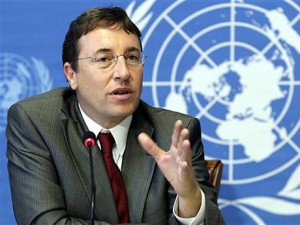The recent release of United Nations Environment Programme’s (UNEP) Fifth Emissions Gap Report is attracting a growing number of voices, including those of the 900 non-governmental organisations (NGOs) working together in Climate Action Network (CAN), which are calling for governments to scale up climate action to achieve a phase out of carbon pollution to zero by mid-century.

Similarly, Executive Secretary of the United Nations Framework Convention on Climate Change (UNFCCC), Christiana Figueres, has welcomed the report, which underlines how the world can keep a global temperature rise under 2 degrees Celsius.
Figueres said: “This important report underscores the reality that at some point in the second half of the century, we need to have achieved climate neutrality – or as some term it zero net or net zero – in terms of overall global emissions.
“The report also emphasises the wider important contributions that can be made to local and national sustainable development goals, if climate change is effectively addressed.”
The UNEP report comes on the back of another blockbuster report, the Intergovernmental Panel on Climate Change’s (IPCC) Fifth Assessment Report, which was released on November 1 and endorsed by governments. It said that the only way the world economies can still prosper is if countries phase out fossil fuel pollution entirely while adapting to the impacts of climate change.
The UNEP report makes plain that if governments scale up climate action now, they will unlock the benefits of action for their communities, such as better public health, more secure livelihoods and a reduction in poverty.

The concept of a global carbon budget shared by all nations – put forward by both the IPCC and UNEP – and the bold NGO call for phasing down emissions to zero by 2050 have now both been added to new draft negotiating texts for the international agreement to limit climate change due to be finalised in December 2015 in Paris.
At the major UN climate negotiations in Lima next month, governments can support these concepts in the text as way to guide collective climate action. They can sign off on a platform that would support countries to roll out more renewable energy, invest in energy efficiency and build smarter ways of powering our lives.
In early 2015, governments will table a commitment to take climate action which will speed up the ongoing transition of our economies away from reliance on fossil fuels that drive climate change and towards 100% renewable energy – a shift more and more citizens, businesses, investors and scientists are demanding and driving.
“To maximise benefits and ensure a safer world, we can and must use the powerful combination of short and medium term efforts to reduce emissions and increase resilience, together with a clear vision of our collective long term destination,” said Figueres.
The UNEP Gap Report also focuses on the urgency to act now to achieve ever higher ambition before 2020. This year’s edition of the Emissions Gap Report focusses on opportunities from scaled up action on energy efficiency. These actions range from appliances, lighting standards and labeling to tighter building codes and vehicle fuel standards.
The report suggests that improved energy efficiency has the potential to reduce greenhouse gas emissions by between 3 to 7 gigatonnes of carbon dioxide equivalent (Gt CO2 e) a year.
Other key findings of the report underline the wider, sustainable development imperative of addressing climate change.
The World Health Organisation (WHO) says that seven million people die prematurely each year from indoor & outdoor air pollution, mostly in developing countries.
Energy efficiency improvements reduce fossil fuel use and thereby also air pollution emissions, and save lives. One study states that 100,000 premature deaths could be avoided every year by 2030 in the US, the EU, India, Brazil, China and Mexico.
Further benefits:
- Greater access to energy: Improving energy efficiency lowers energy costs and makes energy more accessible to poor and middle-class households.
- Jobs: Energy efficiency projects provide millions of jobs worldwide with estimates ranging up to seven million people through an acceleration of energy efficiency.
- Increased industrial productivity: Improving energy use leads to lower energy use per unit of output which extends the life-time of equipment, reduces waste disposal costs, and lowers maintenance.
